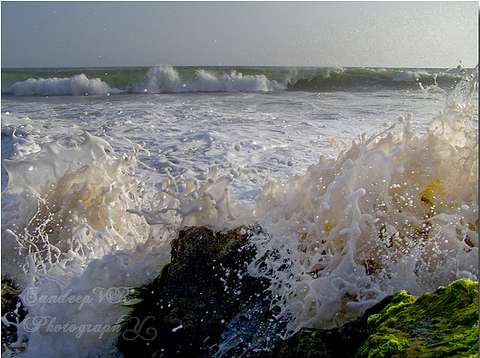FWP:
SETS == A,B; DIALOGUE;
IDIOMS; KYA
MUSIC: {10,3}
DROP/OCEAN verses: {6,6}; {21,8}; {22,5},
{22,8}, {42,3};
{48,1}; {49,11};
{78,2}; {98,7}; {100,4}; {174,8}
This verse evokes the famous (apocryphal?) saying of the mystically-intoxicated sufi Mansur al-Hallaj, anaa))l-;haqq , 'I am God' or 'I am the Truth' in Arabic; for this kind of heretical behavior he was eventually executed.
The pleasure is in the second line, which means something like a shrug of the shoulders and 'About us-- what's there to even ask?' This colloquial easiness is a pleasure in itself. And it's also possible to read it as evoking the idiomatic kyaa puuchhnaa ! , which gestures toward the inexpressibility trope, and means something like 'oh, why even ask-- it's extraordinary beyond words!'.
But of course, we aren't sure what the relationship is between the first line and the second. Is the second line part of the melody that 'is' the heart of every drop of water? If so, every drop simply vibrates to a rather long tune, but one that fits together casually and pleasantly.
Alternatively, the second line could be the speaker's reflection on the first line. Just as every water-drop vibrates to the melody 'I am the sea,' thus refusing any individual identity or any further concern over its own nature or fate, so we (we the individual speaker? we humans?) are His (or, less probably but possibly, 'its'-- the sea's) and there's no point in fussing over our wearisome little egos.
Ghalib was partial to drop/ocean imagery. See also {6,6}, in which the drop is linked not to the ocean but to the emergence of a typhoon [:tuufaan]. And {78,2} too goes off in a direction of its own.
Note for meter fans: The Arabic phrase as written of course entirely fails to scan. For reasons governed by Arabic grammar, the actual pronunciation of it is a-nal-ba;h-r , - = = - (with the final r as a cheat syllable that doesn't count).

Nazm:
That is, every drop claims unity with the sea. In the same way, we too claim oneness with our source. (23)
[See also his comments when discussing {174,8}.]
== Nazm page 23